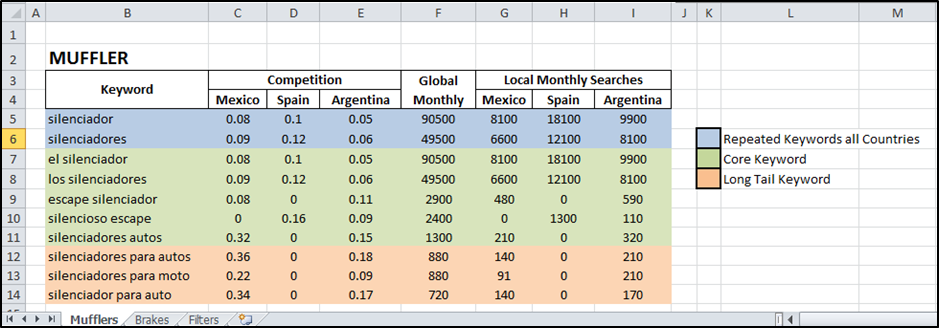How Spanish Keywords Research Goes Wrong
How Spanish Keywords Research Goes Wrong
Updated: 11-30-20
Why would your business be interested in a better understanding of Spanish SEO keyword research? To start, the ecommerce market in Mexico is expected to exceed $18.5 million dollars in 2020. Furthermore, the annual growth rate is expected to increase by 5% in the next five years.
Even better, a lot of US-based brands attempting to penetrate the Mexican market are … doing it wrong.
Gain a better understanding of how brands are making mistakes when marketing to Latin Americans. Then, realize why translation is not enough for keyword research or an overall Spanish SEO campaign.
How Spanish Keyword Research Gets Tricky
Potential customers come to us and say “I want to rank for keyword X,” but in Spanish, it’s a bigger issue. Each country/region could have a different way of referring to the same thing!
Let’s use the word “cacho” as an example of how words, meanings, and references differ depending on region.
Spanish Keyword -> “Cacho”
See how “cacho” adopts different meanings depending on region:
- Spain and Mexico: Piece, portion of something
- Colombia: Joint
- Ecuador: Lie, usually humorous
- Bolivia and Chile: Problem
- Honduras: Phone
- Salvador: Type of bread with sesame seeds
- Venezuela:Infidelity, adultery
So, imagine you were doing Spanish SEO keyword research for a phone supplier. “Cacho” makes sense if you’re advertising to consumers in Honduras, but using that word in Venezuela would be an embarrassingly huge mistake…
English to Spanish Translation
Many marketers incorrectly start the Spanish SEO keyword process by relying on translation alone. For example, let’s assume we are helping a brand offer small goods to the Mexican market. Let’s start with one product – piggy banks.
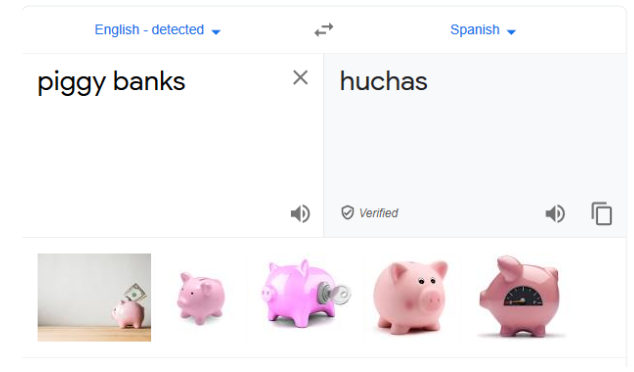
The process seems simple enough. Rather than use the term “piggy banks,” we will suggest using “huchas” to market the product throughout the Mexican market.
No problemo, right?
Wrong. Here’s why.
Online reference tools
Let’s take another wrong turn often made by those doing Spanish SEO keyword research. Let’s use an online resource to take a look at synonyms related to “hucha.”
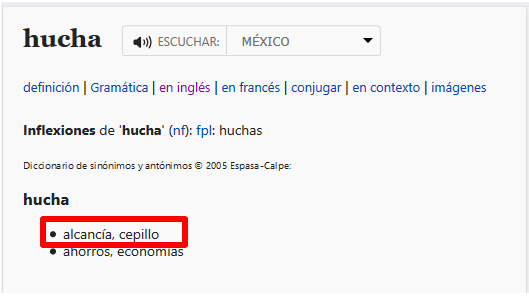
An online reference tool suggests synonyms such as “cepillo.” However, if I say “cepillo” to a consumer in Mexico, will they conjure images of a piggy bank?
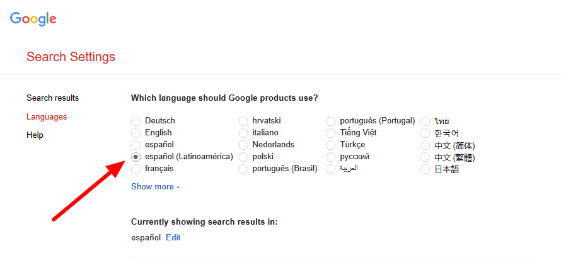
What does a cepillo look like to a consumer in Mexico?

Those piggy banks look a lot like hair brushes to me! If we suggested an American client use “cepillo” in their pursuits to sell piggy banks throughout Mexico, we would be doing an incredible disservice.
Spanish Keywords Research and Geography
“Hucha” is the wrong word to use throughout Latin America, for it’s not a term used throughout the region.
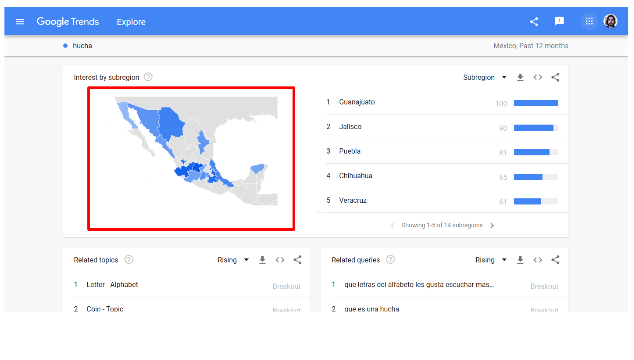
The word is much more appropriate for those in Spain.
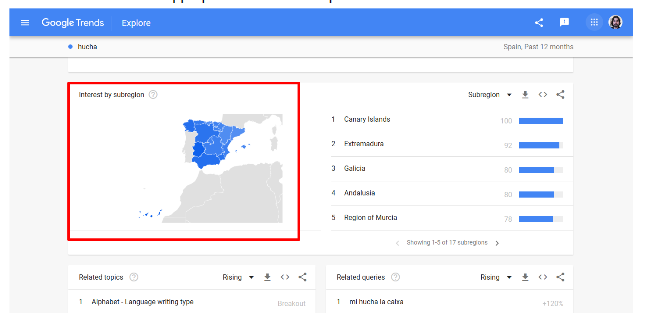
Why regional and local translation matters
Firstly, we can see a massive difference in search volume for “hucha” between Spain and Mexico. 8.9 thousand searches in Spain versus 2.2 thousand in Mexico.
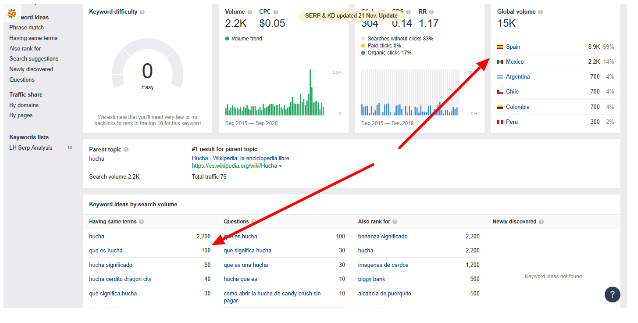
Secondly, we see that people in Mexico are actually trying to figure-out what a “hucha” is?
In summation, if hucha was applied to a Spanish SEO campaign targeted at Mexican buyers, it would be unsuccessful.
Translation and Spanish Keywords
In the above scenario, the Spanish SEO keyword research was doomed from the start because it relied too heavily on translation rather than considering regional dialects — how speakers of the same language may use it very differently depending on geography.
Even huge, name brands make costly mistakes.
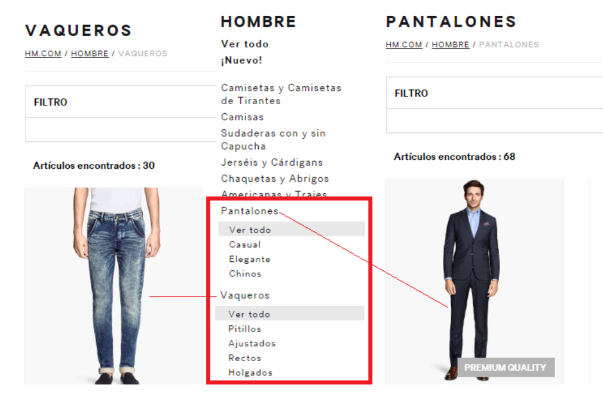
In this attempt to sell jeans to the Mexican market, the brand uses “vaqueros.” But, that is not apropos for the Latin American market that uses “mezclilla” or just “jeans” to seek the product.
Even the classification system is not in alignment with how Mexicans shop; local, Mexican brands split the pants merchandise into formal and casual categories.
Spanish Keywords Research in the Future
Let’s assume we are doing keyword research for the word “mufflers” and exploring keyword possibilities to sell associated parts throughout the Spanish market.
If you sell car parts, you might put all the words related to mufflers in one category, brakes in another, filters in another and so on. This makes each list more manageable.
Then, you have to decide which keywords are most important. Preliminary keyword research may look something like this:
First, look at all the times that a keyword phrase is repeated…If this happens, it is a good thing! It tells us that this keyword has broad appeal and should be considered for inclusion in your campaign. Then, we look for slight variations on the same keyword.
Finally, we start qualifying the remaining keywords. Organizational structure is up to you, but we like to create tiers. Generally we separate into the following groups: Core Keywords, Informational, Transactional, Singular/Plural and Long Tail.
Excellent keyword research is essential for a Spanish SEO campaign because of all the additional markets to consider. You need to hire someone who is a native Spanish-speaker, preferably one who is literate enough to know something about the different meanings a word or phrase might have. If you are going after multiple markets, get someone from each market to take a look at both your English and Spanish lists.


